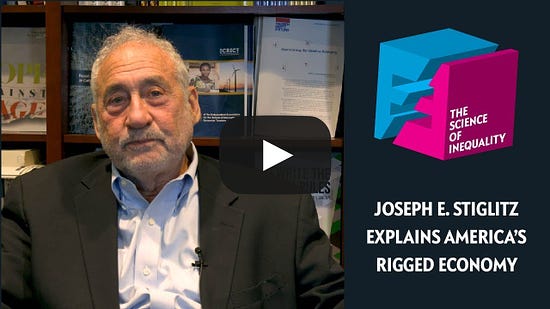Is The U.S. Economy "Rigged" In Favor Of The Wealthy & Against The Poor & Middle Class?
Welcome to The Poverty Trap: Why the Poor Stay Poor in America. I’m thrilled that you signed up to read my newsletter, and I hope that you will enjoy participating in our community. Everyone deserves the opportunity to thrive in our country, and we can work together to make that happen. Please share this newsletter with your friends and family when you have a spare minute. Thanks! If you have the means, do upgrade your subscription to Paid—your financial support of my writing will help me to continue and expand the newsletter!
Is The U.S. Economy "Rigged" In Favor Of The Wealthy & Against The Poor & Middle Class?Rude Spoiler Alert: Yes, But We Can Change It...This post goes out to both free and paid subscribers, but if you are not already a paid subscriber and value this effort and our growing community, please consider upgrading to a paid membership. But wait, there’s a sale going on at The Poverty Trap! For all NEW yearly Suscribers and NEW founding members, you will get 20% off if you sign up today through February 29, 2024. Thanks in advance for your financial support of my work —it’s what allows me to keep researching and writing. “When asked what drives the economy, many Americans have a simple, single answer that comes to mind immediately: “greed.” They believe the rich and powerful have designed the economy to benefit themselves and have left others with too little or with nothing at all.” The New York Times, February 21, 2024 I was checking out at a grocery the other day during a time when almost no other customers were in the store. While the cashier was scanning my eight cans of a rare brand of cod pate (for my elderly cat), she was chatting with two other employees, one of whom was using a wheelchair. This woman was incredibly frustrated at her boss who kept scheduling her for too many work hours, even though she had told her many times that she was receiving disability payments and could not earn over a certain amount of money without cutting or losing her benefits entirely. I understand that being able to work full time and still receive full disability payments each month doesn’t make sense, but the government sets incredibly low limits on how much a disabled and/or poor person can earn and still receive benefits like disability payments, food stamps, health care and home heating and cooling assistance. And these limits are still based on antiquated notions of what amount of money it takes to survive in the United States today and what amounts the poor and disabled should be given, lest they get too comfortable. The recent New YorkTimes opinion piece quoted above is written by two researchers and authors who both hold positions at the American Academy of Arts & Sciences. Catherine J. Kramer, who co-wrote the Times piece and was one of several authors of an extensive report for the Academy titled: “Reimagining Our Economy”¹ suggests these “benefit cliffs” as they’re called, be modified to transition people to fully support themselves before 100% of the benefits are ripped away. An example the researchers used is the earnings cut-off associated with Medicaid. In Kansas, the top amount a family of four can earn and still receive Medicaid is $39,900. I pretty sure with today’s cost of housing and groceries, a family of one couldn’t make it anywhere on just under $40,000, but earning even $1 more than $39,900 kicks that four-person family off of what is basically free health insurance. While the Affordable Care Act likely would provide premium subsidies, they would still have doctor visit and prescription co-pays, and a hefty deductible before insurance provided coverage. If we want an economic system that is less “rigged” against the majority of Americans, the “Reimagining Our Economy” report provides a recommendation:
The Poverty Trap has discussed the idea that our economy is purposefully skewed to favor corporations and wealthy individuals through its laws and policies. I explained in my “About” page and in numerous posts over the last two-plus years what I mean when I used the term “rigged” and credit Senator Bernie Sanders and Robert Reich for helping me better understand how our economic, political and legal systems are set up to benefit the wealthy and let the poor and middle class fend for themselves. Here’s a brief explanation about how the U.S. economy actually increases inequality and the ramifications of these laws and policies from Nobel Laureate, Joseph E. Stiglitz. The video was published in 2018 by Scientific American.  “It’s very hard to have sustained growth without shared prosperity.” Joseph E. Stiglitz, 2001 winner of the Nobel Prize in Economics. There are other ways, in addition to our reticence to help the poor, that our government’s policies not only condone but support inequality. Another issue that has been much discussed in recent years is the soaring pay gap between the CEO’s of major companies and those companies’ average workers. According to a CBS News MoneyWatch report published in September of last year:
What’s startling about these statistics, particularly how CEO pay and benefits soared during the pandemic while many of us were hurting financially and depending on government help, is that during 2021 when the pay gap was at its highest and CEO’s were taking home a whopping 399 times more than their average worker, a cry rose from conservatives in general, and businesses in particular, to cut government aid to individuals. And that is exactly what happened. Three types of expanded unemployment benefits ended in September of 2021 and were not renewed. In fact, many states, including Ohio, stopped the extra unemployment benefits several months before the program officially ended in early September, 2021, and returned the money to the federal government rather than allow unemployed workers a few extra bucks that were already allotted to them — and it wasn’t even the states’ money! And we haven’t even touched the lopsided tax code that has for over half a century, allowed both corporations and the wealthiest individuals to pay a lower federal tax rate than their salaried employees, including the administrative assistants and secretaries without whom their businesses wouldn’t be able to function. Or taxpayer money that subsidizes every move corporations make, so they will be sufficiently incentivized to expand their businesses and create more low-paying jobs. On the other hand, those who represent business interests claim corporate subsidizes allow the government to nudge business in the direction it wants it to go, like creating lower cost housing and green energy alternatives. But to the tune of well over $100 billion annually? So what can we do both individually and collectively to “unrig” our system and lesson the gap between the rich and everyone else? It starts with understanding the issues that affect our economy, like those discussed here, and then doing a little research on our current elected officials at every level. Where do they stand on these issues and what specific actions have they taken to “even the playing field” for those without substantial money or power? If their actions in office don’t line up with what we’ve learned that is necessary to close the wealth gap, then vote them out, and vote in people with compassion and the smarts to see that we all have to thrive, that sustained economic growth depends on shared prosperity, as the economist Joseph Stiglitz said. Together, we have to make it clear to our current elected officials, or the next generation we allow to govern us, that they and our government are here to serve and promote the common good, not special interests. ________________________________________________________ Do you think our economic system is “rigged” or purposely designed to benefit the wealthy and corporations at the expense of the rest of us? What can we do to level the playing field and close the wealth and inequality gap? Please share your thoughts in the Comment Section below—thanks! And if you are not already a subscriber, don’t forget to sign up for a free subscription to The Poverty Trap and/or upgrade to paid! Don’t forget the 20% off sale only runs through February 29! 1 The American Academy report, published in November 2023, includes an amazing, interactive chart that allows you to see the economic security variables for each county in the United States: https://corescore.us/economic-security-2021-usa/quadrant_1/2021/00?demographic=education-high_school_graduate You’re on the free list for The Poverty Trap: Why the Poor Stay Poor In America. All posts are free for now, but if you’d like to get ahead of the crowd, feel free to support my work by becoming a paid subscriber. |
Older messages
Change Is A Comin'...
Sunday, September 24, 2023
Listen now (6 mins) | And Not In Name Only
The Incredible Shrinking Middle Class
Sunday, September 17, 2023
Listen now (13 mins) | Where Has It Gone...And Can America Get It Back?
"Unity Is Strength"
Wednesday, September 6, 2023
Listen now (9 mins) | Why Workers Still Need To Flex Their Muscle Through Unions
Climate Change Policy
Monday, August 28, 2023
And How It Affects You — A Few Monday Readings
Inflation Is Going Down, Food Prices Continue To Rise —
Monday, August 21, 2023
Listen now (13 mins) | And More People Are Going Hungry
You Might Also Like
Living seasonally
Friday, February 28, 2025
10 things worth sharing this week ͏ ͏ ͏ ͏ ͏ ͏ ͏ ͏ ͏ ͏ ͏ ͏ ͏ ͏ ͏ ͏ ͏ ͏ ͏ ͏ ͏ ͏ ͏ ͏ ͏ ͏ ͏ ͏ ͏ ͏ ͏ ͏ ͏ ͏ ͏ ͏ ͏ ͏ ͏ ͏ ͏ ͏ ͏ ͏ ͏ ͏ ͏ ͏ ͏ ͏ ͏ ͏ ͏ ͏ ͏ ͏ ͏ ͏ ͏ ͏ ͏ ͏ ͏ ͏ ͏ ͏ ͏ ͏ ͏ ͏ ͏ ͏ ͏ ͏ ͏ ͏ ͏ ͏ ͏ ͏ ͏ ͏ ͏ ͏
Are Voters Souring on the Trump Economy?
Friday, February 28, 2025
Trump is starting to pay a price for ignoring the issue that got him elected. ͏ ͏ ͏ ͏ ͏ ͏ ͏ ͏ ͏ ͏ ͏ ͏ ͏ ͏ ͏ ͏ ͏ ͏ ͏ ͏ ͏ ͏ ͏ ͏ ͏ ͏ ͏ ͏ ͏ ͏ ͏ ͏ ͏ ͏ ͏ ͏ ͏ ͏ ͏ ͏ ͏ ͏ ͏ ͏ ͏ ͏ ͏ ͏ ͏ ͏ ͏ ͏ ͏ ͏ ͏ ͏ ͏ ͏ ͏ ͏ ͏ ͏
“Amto remembers Hussein, Aljibbayn 1983” by Kamelya Omayma Youssef
Friday, February 28, 2025
When the martyr died in my arms, / I pleaded ͏ ͏ ͏ ͏ ͏ ͏ ͏ ͏ ͏ ͏ ͏ ͏ ͏ ͏ ͏ ͏ ͏ ͏ ͏ ͏ ͏ ͏ ͏ ͏ ͏ ͏ ͏ ͏ ͏ ͏ ͏ ͏ ͏ ͏ ͏ ͏ ͏ ͏ ͏
Imagine the space gossip
Friday, February 28, 2025
— Check out what we Skimm'd for you today February 28, 2025 Subscribe Read in browser Header Image But first: Is this man testing the Sabrina Carpenter curse? Update location or View forecast Quote
This Dreamy Dress Trend Will Be Everywhere In 3 Months
Friday, February 28, 2025
Fairytale moments from London Fashion Week. The Zoe Report Daily The Zoe Report 2.27.2025 This Dreamy Dress Trend Will Be Everywhere In 3 Months (Runway) This Dreamy Dress Trend Will Be Everywhere In 3
3x3: February 27, 2025
Friday, February 28, 2025
February is the worst month ͏ ͏ ͏ ͏ ͏ ͏ ͏ ͏ ͏ ͏ ͏ ͏ ͏ ͏ ͏ ͏ ͏ ͏ ͏ ͏ ͏ ͏ ͏ ͏ ͏ ͏ ͏ ͏ ͏ ͏ ͏ ͏ ͏ ͏ ͏ ͏ ͏ ͏ ͏ ͏ ͏ ͏ ͏ ͏ ͏ ͏ ͏ ͏ ͏ ͏ ͏ ͏ ͏ ͏ ͏ ͏ ͏ ͏ ͏ ͏ ͏ ͏ ͏ ͏ ͏ ͏ ͏ ͏ ͏ ͏ ͏ ͏ ͏ ͏ ͏ ͏ ͏ ͏ ͏ ͏ ͏ ͏ ͏ ͏ ͏ ͏ ͏
Should You Do Cardio Before or After You Lift Weights?
Thursday, February 27, 2025
View in Browser Men's Health SHOP MVP EXCLUSIVES SUBSCRIBE Should You Do Cardio Before or After You Lift Weights? Should You Do Cardio Before or After You Lift Weights? If you're combining two
This Google Tool Can Hide Your Personal Info From Search
Thursday, February 27, 2025
Alexa Is Getting an AI Upgrade. Take your privacy back from Google Search. Not displaying correctly? View this newsletter online. TODAY'S FEATURED STORY This Google Tool Can Help Hide Your Personal
“Shakespearean Red,” Dirty Blonde, & More Of Spring’s Biggest Hair Color Trends
Thursday, February 27, 2025
Plus, the spiritual meaning of the new moon, your daily horoscope, and more. Feb. 27, 2025 Bustle Daily LIFE Did Smart Phones Make Us All Stream-Of-Consciousness Texters? Sajina Shrestha self-
Her Student Loans Were Forgiven. Then They Came Back.
Thursday, February 27, 2025
Today in style, self, culture, and power. The Cut February 27, 2025 PERSONAL FINANCE She Thought Her Student Loans Were Gone. Then They Came Back to Haunt Her. Student borrowers are seeing ghost loans

